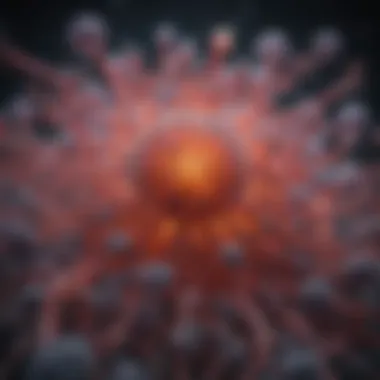Immunotherapy's Impact on Colon Cancer Treatment


Intro
Immunotherapy has emerged as a transformative approach in the treatment of various cancers, including colon cancer. Traditional treatments like chemotherapy and radiation have been the mainstay, but immunotherapy offers a novel angle, leveraging the body's immune system to combat tumor cells more effectively. This shift encourages exploration into not only how these therapies function but also their real-world impacts on patient outcomes.
The rising interest in immunotherapy is backed by a surge in research and clinical trials that provide insight into its mechanisms. These studies highlight diverse strategies that harness immune responses, with some showing promising results in improving survival rates and quality of life. The current article aims to unravel these findings while also addressing the limitations and ongoing challenges that necessitate further investigation.
Understanding immunotherapy's role in colon cancer requires a clear perspective on the methodologies used in its research and application. The following section will explore the various research techniques employed to assess immunotherapy's efficacy.
Prologue to Colon Cancer and Treatment Modalities
Understanding colon cancer along with its treatment options is crucial. Colon cancer stands as one of the most prevalent malignancies. With growing incidence rates globally, it is important for stakeholders, including patients, healthcare professionals, and researchers, to grasp the complexities of this disease and its available treatments. The discussion around treatment modalities plays a vital role in the management of colon cancer, particularly as new methods like immunotherapy emerge.
Overview of Colon Cancer
Colon cancer begins in the large intestine, or colon, and may arise from precancerous polyps. These polyps can develop over time, with some evolving into cancerous cells if left unchecked. Risk factors include age, family history, diet, and lifestyle choices. Early detection of colon cancer can significantly enhance treatment efficacy and patient outcomes.
Conventional Treatment Approaches
Conventional treatment options include surgery, chemotherapy, and radiation therapy. Each modality has its unique characteristics and roles in the management of colon cancer.
Surgery
Surgery is often the primary approach for localized colon cancer. The goal is to remove the tumor along with surrounding healthy tissue to ensure complete excision. This method is particularly beneficial for patients with early-stage disease. It is considered effective because it directly targets the cancerous cells. However, surgical interventions can carry risks such as infections or complications during recovery.
Chemotherapy
Chemotherapy employs drugs to eliminate cancer cells. It is commonly used for patients with advanced colon cancer or as an adjuvant therapy following surgery. A key feature of chemotherapy is its ability to target rapidly dividing cells, making it effective in managing tumor growth. This approach, although prevalent, often comes with side effects like nausea and fatigue, affecting overall quality of life.
Radiation Therapy
Radiation therapy uses high-energy waves to destroy cancer cells. It may be administered before surgery to shrink tumors or afterward to eliminate remaining cancerous cells. One of the appealing aspects of radiation is its non-invasive nature. However, this modality may also entail side effects, such as skin irritation and fatigue.
Understanding these conventional methods is vital as they lay the groundwork for newer approaches, like immunotherapy, which aims to enhance the body's immune response against cancer. By comprehending the established treatments, one can better appreciate the innovations occurring in the field of oncology.
Understanding Immunotherapy
Immunotherapy has become a significant focus in the treatment of colon cancer. This field represents a shift towards utilizing the body's immune system to combat cancer cells. Understanding immunotherapy provides insight into its potential benefits, specific mechanisms of action, and application in clinical settings. As researchers explore various approaches, this section aims to clarify the complexities surrounding immunotherapy and how it aligns with traditional treatment modalities.
Definition and Mechanism of Immunotherapy
Immunotherapy refers to a range of treatments that enhance or manipulate the immune system's response to cancer. This approach aims to unmask cancer cells by allowing the immune system to better recognize and attack them. Several mechanisms are in place: immune checkpoints, which are molecules on immune cells that need to be activated or inhibited for an effective immune response, play a critical role.
For instance, checkpoint inhibitors block these signaling pathways, essentially removing brakes from the immune system and enabling it to destroy malignant cells more effectively. The therapeutic strategies harness both the innate and adaptive immune responses, making them versatile and potent in colon cancer treatment.
Types of Immunotherapy
Immunotherapy encompasses various strategies, each with unique characteristics and applications. Below are the primary types currently used in colon cancer therapy:
Monoclonal Antibodies
Monoclonal antibodies are engineered proteins designed to target specific antigens on cancer cells. Their ability to bind selectively to antigens helps mark cancer cells for destruction by the immune system. The use of monoclonal antibodies is beneficial due to their specificity, reducing damage to healthy tissues. A prominent example is Cetuximab, which targets the EGFR pathway, crucial in regulating cell growth. However, their use can lead to limited responses in patients without corresponding antigens and may provoke immune-related adverse effects.


Checkpoint Inhibitors
Checkpoint inhibitors block immune checkpoint proteins, allowing T-cells to attack cancer cells without inhibition. Pembrolizumab and Nivolumab are examples that have shown promising results in certain colon cancer patients, particularly those with microsatellite instability. The critical feature of these drugs lies in their ability to revive exhausted T-cells, enhancing the immune response. Nevertheless, some patients may experience autoimmune side effects due to increased immune activity.
Cancer Vaccines
Cancer vaccines stimulate the immune system to recognize and destroy cancer cells. Unlike traditional vaccines, which prevent disease, these are designed to treat existing conditions. These vaccines, such as the Sipuleucel-T, can provoke a robust immune response. They focus primarily on patient-specific tumor antigens, making them a tailored treatment. However, the overall efficacy often varies from patient to patient, limiting their broader applicability.
Adoptive Cell Transfer
Adoptive cell transfer involves modifying patients' T-cells to enhance their cancer-fighting abilities. This technique can lead to strong immune responses against tumors. CAR T-cell therapy is an example used in other cancers, showing ongoing promise in colon cancer based on initial findings. The advantage here is the ability for the immune cells to target specific cancer cells effectively. The downside is the complexity of the procedure and potential for severe side effects due to heightened immune activation.
Immunotherapy in Colon Cancer: Current Perspectives
Immunotherapy is becoming a central focus in treating colon cancer. This approach leverages the body's immune system to recognize and combat cancer cells. As conventional therapies, such as surgery, chemotherapy, and radiation, continue to play significant roles, immunotherapy offers a promising complement. The exploration of this treatment highlights its distinct mechanisms, response rates, and overall impact on patient outcomes.
Understanding immunotherapy's current perspectives in colon cancer allows for a nuanced view of its role in the treatment landscape. Improved efficacy and patient selection can lead to more tailored treatments that extend survival and enhance quality of life for patients.
Clinical Trials and Results
Clinical trials are essential for validating the effectiveness of immunotherapy in colon cancer. These trials yield critical data that frame treatment protocols and guide clinical practice.
Key Findings
The key findings from recent trials often center on the objective response rates in patients with microsatellite instability-high (MSI-H) tumors. Many patients exhibit noteworthy responses to immune checkpoint inhibitors, such as pembrolizumab. These results demonstrate that a subset of colon cancer patients derives substantial benefit from this treatment, which is a clear indicator of immunotherapy's evolving landscape. However, it is crucial to understand that not all patients experience the same level of benefit.
Evidence shows that 42% of MSI-H patients have favorable outcomes from immunotherapy, which is significantly higher than conventional treatment methods. This finding marks immunotherapy as a beneficial option for specific patient groups.
Trial Designs
The design of clinical trials for immunotherapy in colon cancer has shifted to accommodate a deeper understanding of tumor biology. Adaptive trial designs are becoming more common, allowing for real-time modifications based on interim results. This flexibility can lead to more effective treatments and quicker adaptation to patient needs.
A crucial feature of modern trial designs is the focus on biomarker stratification. Such designs enable researchers to identify which patients are most likely to respond. While this enhances the relevance of findings, the complexity of these designs can result in longer timelines and increased costs for trials.
Patient Selection Criteria
Accurately identifying candidates for immunotherapy is vital. Patient selection criteria have become increasingly sophisticated, focusing on biomarkers like microsatellite instability and PDL-1 expression. This precision aims to match the right patients with the right immunotherapy, enhancing the likelihood of a positive outcome.
Key patient characteristics, including prior treatment history and tumor characteristics, dictate eligibility. The downside is that these criteria may exclude some patients who might benefit from treatment, highlighting the need for a balance in selection processes.
Response Rates and Survival Outcomes
Evaluating response rates and survival outcomes is crucial for assessing the benefits of immunotherapy in colon cancer.
Long-term Outcomes
Long-term outcomes from immunotherapy trials indicate durable responses in specific populations. Recent studies report that patients with MSI-H colon cancer have survival rates that exceed those of patients receiving standard chemotherapy. The potential for longstanding remission presents a compelling argument for integrating immunotherapy into treatment regimens.
A key characteristic of these results is the extended progression-free survival observed in patients. However, not all patients experience the same outcomes, and this variance requires continuous monitoring of response mechanisms.
Progression-Free Survival
Progression-free survival is a critical metric in assessing immunotherapy efficacy. For patients responding to treatment, the time before disease progression significantly extends compared to traditional therapies. Many studies indicate that those treated with checkpoint inhibitors have notably improved progression-free survival compared to other treatment modalities.


This unique feature of immunotherapy enhances its appeal as a primary treatment choice, particularly for patients unresponsive to other therapies. However, careful monitoring is essential, as some patients may face potential relapses post-treatment.
Importantly, ongoing clinical research will further elucidate the long-term benefits and optimization of immunotherapy in colon cancer care.
Biomarkers in Immunotherapy for Colon Cancer
Understanding biomarkers in immunotherapy for colon cancer is vital for targeted treatment strategies. Biomarkers help in selecting appropriate therapies and predicting patient responses to immunotherapy. In this section, we will explore key components of biomarkers, focusing on their role in treatment efficiency and patient management.
Role of Microsatellite Instability
Definition and Importance
Microsatellite instability (MSI) refers to the condition of genetic hypermutability that occurs when the DNA mismatch repair (MMR) system is dysfunctional. MSI is an important biomarker in colon cancer because it can directly affect treatment outcomes. The high frequency of mutations in MSI-high tumors often makes them more recognizable to the immune system, enhancing the effectiveness of immunotherapy.
This characteristic of MSI contributes significantly to the overall treatment strategy. By identifying MSI status, oncologists can tailor treatments specifically to the patient's tumor profile. A key feature of MSI is that tumors exhibiting this instability are more likely to respond positively to checkpoint inhibitors, making it a popular choice in immunotherapy discussions. However, determining MSI status may have financial implications and can delay treatment initiation.
Impact on Treatment Decisions
The impact of microsatellite instability (MSI) on treatment decisions is substantial. Knowing a tumor's MSI status aids in deciding between conventional therapies versus immunotherapy. Patients with MSI-high tumors are often candidates for pembrolizumab and nivolumab, both approved for this context. This biomarker serves as a guide for clinicians in recommending more personalized treatment routes.
The unique feature of MSI in decision-making involves its predictive ability; however, it is essential to understand that not all patients with MSI-high tumors will respond uniformly. This variance underscores the importance of not solely relying on MSI for treatment plans as it may overlook other crucial factors.
Predictive Biomarkers and Their Relevance
Genetic Profiling
Genetic profiling in colon cancer involves assessing specific genetic alterations that can indicate responsiveness to immunotherapies. This form of profiling can uncover mutations that are actionable. The significance of genetic profiling lies in its ability to personalize treatment paths, focusing on what works best for the individual patient rather than a one-size-fits-all approach.
A crucial aspect of genetic profiling is its growing ability to inform treatment decisions, particularly concerning targeted therapies. Genetic alterations can reduce reliance on standard treatments and bring into focus how effective immunotherapy will be. Although it shows promise, one limitation of this approach is the complexity of genetic data interpretation, which may require specialized expertise.
Tumor Microenvironment
The tumor microenvironment is another predictive biomarker with increasing relevance in colon cancer immunotherapy. It refers to the surrounding cells, blood vessels, immune cells, and signaling molecules within and around the tumor. The tumor microenvironment can influence immune responses to treatment.
A key characteristic of the tumor microenvironment is its heterogeneity, meaning that it can differ greatly between patients. Understanding these differences allows for a more nuanced approach in therapy selection. However, assessing the tumor microenvironment can be daunting due to its complexity and the need for advanced analytical techniques.
In summary, biomarkers play a crucial role in the efficacy of immunotherapy for colon cancer. They guide treatment decisions, inform patient-specific strategies, and can improve overall outcomes. Keeping a close watch on developments in this area will be important as techniques continue to evolve.
Comparison of Immunotherapy Versus Conventional Therapies
The comparison of immunotherapy versus conventional therapies is essential in understanding how new treatment modalities are reshaping outcomes in colon cancer. It highlights differences in efficacy, mechanisms of action, and side effect profiles. Conventional treatments like surgery, chemotherapy, and radiation have long been the standard care for colon cancer, each with its own merits and limitations. In contrast, immunotherapy introduces a novel approach by engaging the body's immune system to target and eliminate cancer cells.
Efficacy Comparisons
Immunotherapy shows a distinct profile when compared to conventional therapies. While surgery often provides immediate local control of the tumor, it does not address systemic disease effectively. Chemotherapy can reduce tumor size but often comes with a range of extensive side effects. Immunotherapy focuses on harnessing the body's immune response, leading to longer-lasting effects.
Recent clinical trials have indicated that certain populations of patients with high microsatellite instability (MSI-H) benefit significantly from immune checkpoint inhibitors like Pembrolizumab. The response rates are considerably higher in these cases compared to traditional chemotherapy, which may fail after initial responses. Some studies suggest that patients with MSI-H tumors have a remission rate upwards of 40% with immunotherapy, compared to the lower efficacy seen with conventional treatments.
Moreover, the development of biomarkers plays a crucial role in assessing treatment efficacy. Biomarkers such as PD-L1 expression levels help to identify which patients are more likely to benefit from immunotherapy.
Side Effects and Tolerability
In terms of side effects, immunotherapy generally presents a different profile compared to conventional therapies. Surgical interventions always carry risks of complications and postoperative issues. Chemotherapy causes a known spectrum of adverse effects, including nausea, fatigue, and immunosuppression. In contrast, immunotherapy's side effects, while significant, are often immune-related rather than toxicities associated with chemotherapy. These can include colitis, dermatitis, and endocrinopathies.


Patients often report a better quality of life during immunotherapy treatments, as immune-based side effects may be more manageable compared to prolonged chemotherapy regimens. However, the care team must educate patients about the possibility of immune-related adverse events which may require prompt intervention.
"Understanding these differences in side effects is critical not only for treatment adherence but also for the holistic management of the patient."
Challenges and Limitations of Immunotherapy
The potential of immunotherapy in treating colon cancer is considerable, but it is crucial to recognize the challenges and limitations associated with this innovative approach. Despite its promise, immunotherapy aligns poorly with all patients or all cancer profiles. Each patient's unique biological and genetic makeup influences their response to treatment. This variability is one of the most significant impediments to achieving uniform success across patient populations.
Immunotherapy operates by harnessing the body’s immune system to recognize and attack cancer cells. However, certain patients may have immune systems that do not effectively respond to these therapies. Factors such as age, overall health, and co-existing medical conditions can contribute to differences in immunological response. These factors complicate treatment planning and necessitate more personalized approaches to care.
"The varied patient responses highlight the need for comprehensive biomarker analysis and genetic profiling to identify those who may benefit most from immunotherapy."
Patient Variability
Patient variability encompasses a wide range of factors that influence treatment outcomes. The genetic landscape of tumors, often diverse and complex, determines how tumors interact with the immune system. For example, tumors with high mutational burdens may elicit stronger immune responses to immunotherapy.
Moreover, socio-demographic factors, such as ethnicity and gender, can play a role in treatment efficacy. Research shows that specific populations may display varied responses to the same immunotherapeutic agents. This necessitates an understanding of population-specific characteristics when designing clinical trials and interpreting results.
Resistance Mechanisms
Resistance mechanisms further complicate the clinical use of immunotherapy. Cancer cells can adapt and develop ways to evade the effects of immunotherapies. For instance, they may alter their antigen presentation, thereby hiding from immune detection. Additionally, tumor microenvironments can suppress immune activity, leading to a phenomenon known as immune evasion.
There are two main types of resistance: primary resistance, where patients do not respond at all to the treatment, and acquired resistance, where patients initially respond but later relapse after some time. Understanding these mechanisms is essential for developing strategies to overcome resistance.
In summary, while immunotherapy offers hope in treating colon cancer, challenges related to patient variability and resistance mechanisms must be addressed. More research is vital to improve patient outcomes through tailored approaches and combined treatment strategies.
Future Directions in Immunotherapy Research
The field of immunotherapy represents a significant progression in cancer treatment, particularly for patients battling colon cancer. As research continues to expand, it is essential to explore the future directions of immunotherapy. Such exploration is pivotal because it sheds light on potential breakthroughs that can enhance patient outcomes and broaden the scope of treatment options available.
Combination Therapies
Combination therapies are emerging as a frontier in immunotherapy research. The rationale behind these approaches is based on the idea that utilizing multiple treatment modalities can amplify therapeutic effects. For instance, combining immunotherapy with chemotherapy or targeted therapy may produce synergistic effects, allowing for more effective tumor control.
- Mechanism of Action: Different therapies can work through unique mechanisms. For example, chemotherapy may reduce tumor burden, while immunotherapy activates the immune system to attack remaining cancer cells.
- Clinical Trials: Several ongoing clinical trials are examining various combinations of existing therapies with immunotherapy. These trials aim to identify optimized regimens that improve survival rates for colon cancer patients.
- Patient Response: Understanding how certain patient populations respond to these combinations is crucial. Factors like genetic profiling, tumor microenvironment, and prior treatment history can inform which patients will benefit most from combination approaches.
As more data emerges, the integration of combination therapies into standard treatment paradigms may reshape how colon cancer is managed.
Personalized Medicine Approaches
Personalized medicine is a promising area in the research of immunotherapy for colon cancer, focusing on tailoring treatment based on individual patient characteristics. This approach holds the potential for more targeted and effective interventions.
- Genetic Profiling: Advanced techniques in genetic profiling can identify specific mutations or biomarker expressions that may predict a patient’s response to immunotherapy. Understanding these variations can help oncologists select the most appropriate treatment plans.
- Tumor Microenvironment: Each tumor has a unique microenvironment influencing its behavior and response to treatment. By evaluating the immune landscape of a patient’s tumor, researchers can better predict how well they will respond to immunologic interventions.
- Real-World Data: The growing field of real-world evidence is vital. Utilizing data from diverse patient populations can help in understanding the effectiveness of personalized approaches in various demographic groups.
End
Summary of Findings
Throughout this article, we have explored important facets of immunotherapy for colon cancer. Key findings include:
- Mechanisms of Action: Immunotherapy works by empowering the immune system to recognize and attack cancer cells more effectively. The diverse types of immunotherapy, including monoclonal antibodies and checkpoint inhibitors, illustrate the variety of strategies available to enhance immune responses.
- Current Applications: Clinical trials demonstrate promising results, with notable improvements in response rates and survival outcomes for patients with mismatched repair deficiency.
- Patient Outcomes: Immunotherapy’s ability to prolong progression-free survival signifies its role as a vital component in advanced colon cancer treatment.
- Biomarker Significance: The identification of biomarkers, such as microsatellite instability, helps in predicting patient response to immunotherapy, allowing for more personalized treatment plans.
Implications for Future Treatments
The examination of immunotherapy in the context of colon cancer suggests several pathways for future research and clinical application:
- Innovative Combination Therapies: Research indicates that combining immunotherapy with conventional treatments, such as chemotherapy or targeted therapies, may optimize overall treatment effectiveness. Ongoing trials are crucial to determine the most effective combinations.
- Advancements in Personalized Medicine: As our understanding of genetic profiling advances, there is a greater potential to develop personalized treatment regimens that cater to the specific genetic makeup of a patient's cancer. This will likely enhance the precision and success of immunotherapy.
- Addressing Resistance Mechanisms: Future studies should focus on overcoming identified resistance mechanisms to improve the durability of responses to immunotherapy.
- Increasing Accessibility: One of the ongoing challenges lies in making these innovative treatments more accessible to diverse populations, especially those in underprivileged regions.
In closing, immunotherapy holds great promise for revolutionizing colon cancer treatment. Continuous research and development are vital for unlocking its full potential and improving outcomes for patients.



